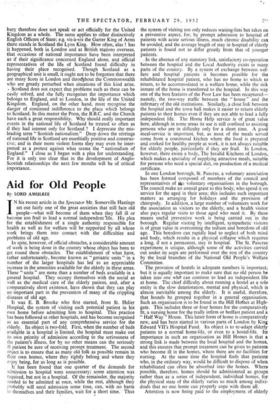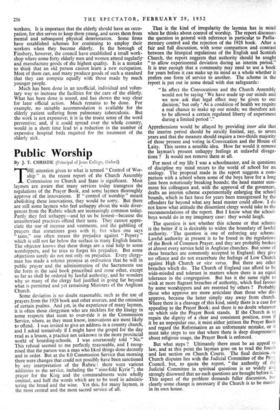Aid for Old People
By LORD AMULREE
IN his recent article in the Spectator Mr. Somerville Hastings set out fairly one of the great anxieties that -still face old people—what will become of them when they fall ill or become too frail to lead a normal independenelife. His plea for the establishment of a single authority responsible for health as well as for welfare will be supported by all whose work brings them into contact with the difficulties and problems of old age.
In spite, however, of official obstacles, a considerable amount of work is being done in the country whose object has been to get round these obstacles. The establishment of what have, rather unfortunately, become known as "geriatric units" in a number of the larger hospitals has led to an appreciable increase in the amenities available for the elderly in these areas. These " units " are more than a number of beds available in a general hospital. They occupy themselves with the social as well as the medical care of the elderly patient, and, after a comparatively short existence, have shown that they can play an important part in the prevention of many of the crippling diseases of old age.
It was E. B. Brooke who first started, from St. Helier Hospital, the system of visiting each potential patient in his own home before admitting him to hospital. This practice has been followed at other hospitals, and has become recognised as an essential part of any comprehensive service for the elderly. Its object is two-fold. First, when the number of beds available in a hospital is limited, the hospital must make out its own priority of admission according to the seriousness of the patient's illness, for by no other means can the seriously ill patient be sure of receiving prompt treatment. The second object is to ensure that as many old folk as possible remain in their own homes, where they rightly belong and where they enjoy being, for as long as is possible. It has been found that one quarter of the demands for admission to hospital were unnecessary; some attention was required, but not in a hospital. Of the remainder, the majority needed to be admitted at once, while the rest, although they probably will need admission some time, can, with no harm to themselves and their families, wait for a short time. ' Thus • the system of visiting not only reduces waiting-lists but takes on a preventive aspect, for, by prompt admission to hospital of patients with acute serious illness, much chronic disability can be avoided, and the average length of stay in hospital of elderly patients is found not to differ greatly from that of younger patients.
, In the absence of any statutory link, satisfactory co-operation between the hospital and the Local Authority exists in many parts of the country. By a system of exchange between wel- fare and hospital patients it becomes possible for the rehabilitated hospital patient, who has no home to which to return, to be accommodated in a welfare home, while the sick inmate of the home is transferred to the hospital. In this way one of the best features of the Poor Law has been recaptured— namely, the two-way traffic between the " house " and the infirmary of the old institutions. Similarly, a close link between the hospital and the town hall makes it easier to return elderly patients to their homes even if they are not able to lead a fully independent life. The Home Help service is of great value here, although in some areas its use is still confined to assisting persons who are in difficulty only for a short time. A good meal-service is important, but, as most of the meals served come from a communal kitchen where the food is prepared and cooked for healthy people at work, it is not always suitable for elderly people, particularly if they are frail. In London, however, there exists a body, The Invalid Kitchens of London, which makes a speciality of supplying attractive meals, suitable for persons who need a special diet, on production of a medical certificate.
In one London borough, St. Pancras, a voluntary association has been formed composed of members of the council and representatives of Ate voluntary organisations in the borough. The council make an annual grant to this body, who spend it on service for the aged in their area; this includes such important matters as arranging for holidays and the provision of chiropody. In addition, a large number of volunteers work for the association as visitors to the elderly, and a health visitor also pays regular visits to those aged who need it. By these means useful preventive work is being carried out in the borough. Regular visiting by intelligent, sympathetic visitors is of great value in overcoming the tedium and boredom of old age. This boredom can rapidly lead to neglect of both mind and body, which results in a physical collapse which requires a long, if not a permanent, stay in hospital. The St. Pancras experiment is unique, although some of the activities carried out under, its aegis are performed over the rest of the country by the local branches of the National Old People's Welfare Committee.
The provision of hostels in adequate numbers is important; but it is equally important to make sure that no old person be taken into one wins can continue to lead an independent life at home. The chief difficulty about running a hostel as a sole entity is the slow deterioration, mental and physical, which is almost inevitable among the elderly. It is useful, therefore, that hostels be grouped together in a general organisation. Such an organisation is to be found in the Hill Hoffies at High- gate. This includes three or four homes for the comparatively fit, a nursing home for the really infirm or bedfast patient and a "Half Way" House. This latter form of home is comparatively new, and has been started in various parts of London by King Edward VII's Hospital Fund. Its object is to re-adapt elderly patients to a normal home-life, or even to a hostel-life. Its importance in such an organisation as Hill Homes is that a strong link is made between the local hospital and the homes, and this ensures that prompt treatment can be given to patients who become ill in the homes, where there are no facilities for nursing. At the same time the hospital finds that patients who, in the ordinary way, would be difficult to dispose of when rehabilitated can often be absorbed into the homes. Where possible, therefore, homes should be administered as groups rather than as a series of independent individual homes, for the physical state of the elderly varies so much among indivi- duals that no one home can properly cope with them all.
Attention is now being paid to the employment of elderly workers. It is important that the elderly should have an occu- pation, for this serves to keep them young, and saves them from mental and subsequent' physical deterioration. Some firms have established schemes for continuing to employ their workers when they become elderly. In the borough 'of Finsbury, however, the council have established a small work- shop where some forty elderly men and women attend regularly.- and manufacture goods of the highest quality. It is a mistake to think that an old person cannot learn a new occupation. Most of them can, and many produce goods of such a standard that they can compete equally with those made by much younger people.
Much has been done in an unofficial, individual and volun- tary way to increase the facilities for the care of the elderly. What has been done is sound, and has shown the way clear for later official action. Much remains to be done. For example, no suitable accommodation is available for the elderly patient suffering from pulmonary tuberculosis. But the work is not expensive; it is in the truest sense of the word preventive; and, if it could spread over the whole country, would in a short time lead to a reduction in the number of expensive hospital beds required for the treatment of the elderly sick.



































 Previous page
Previous page